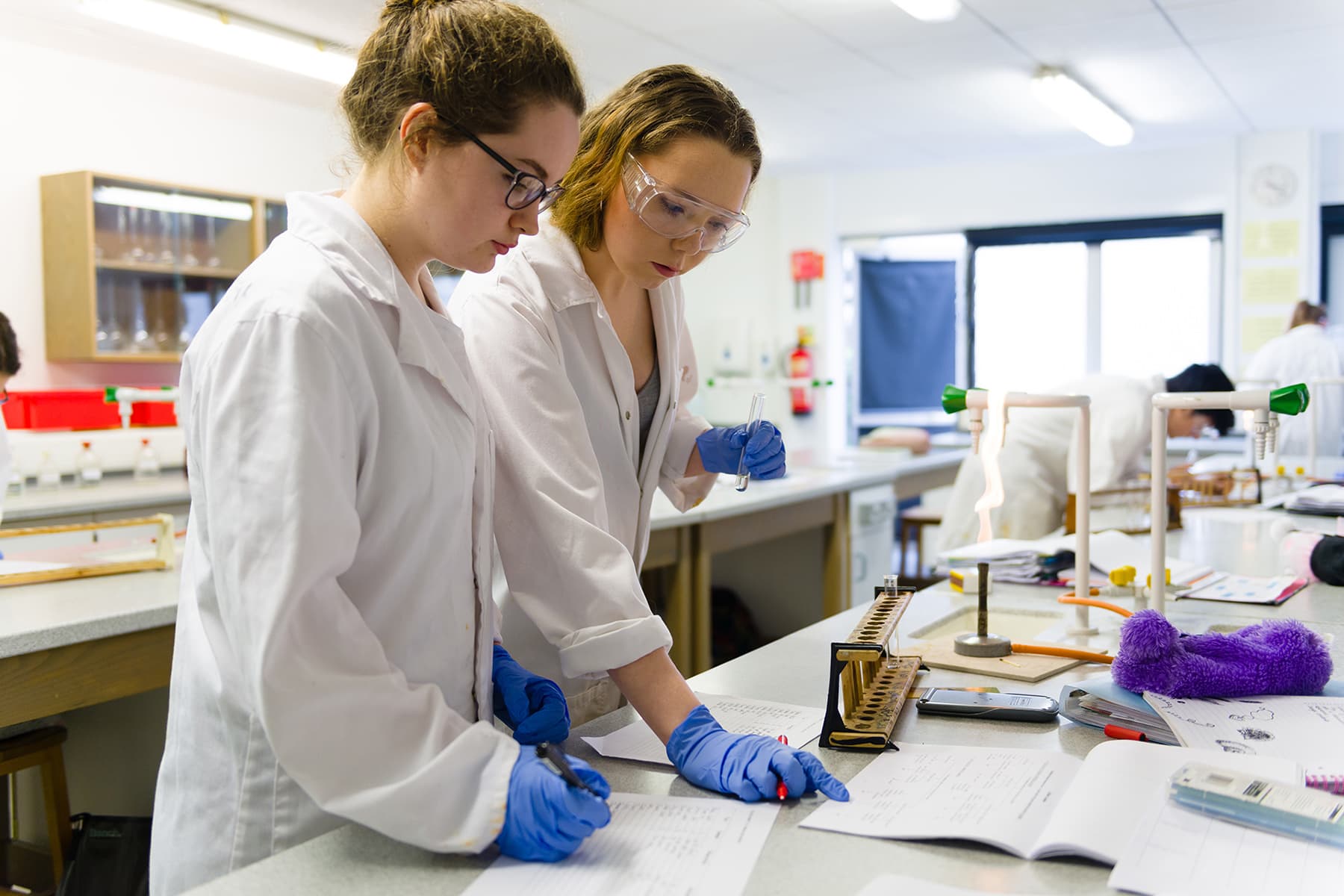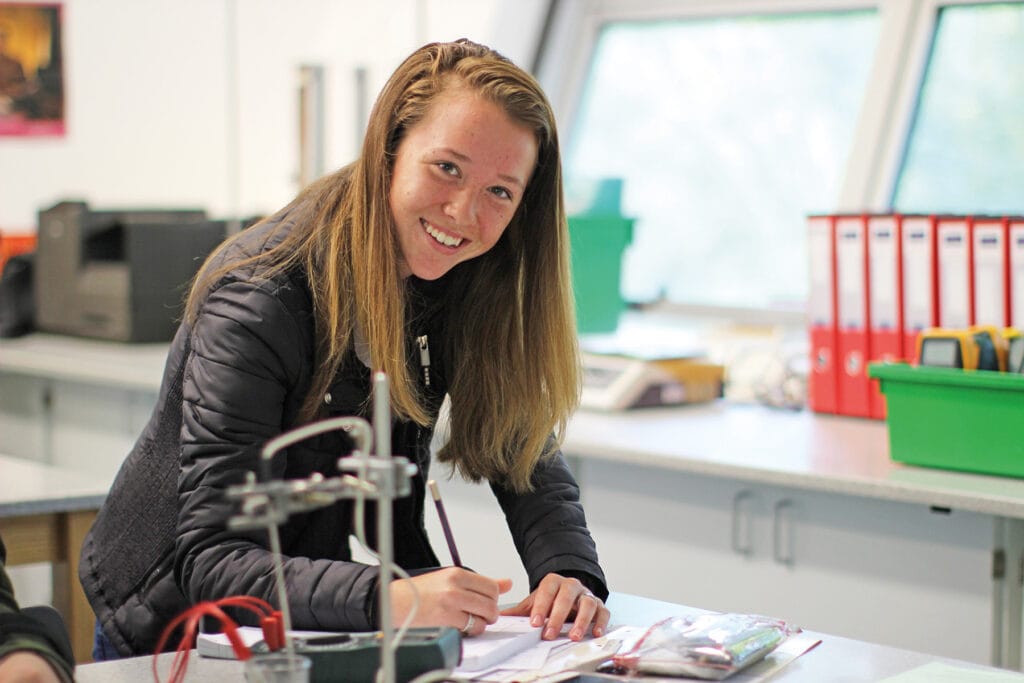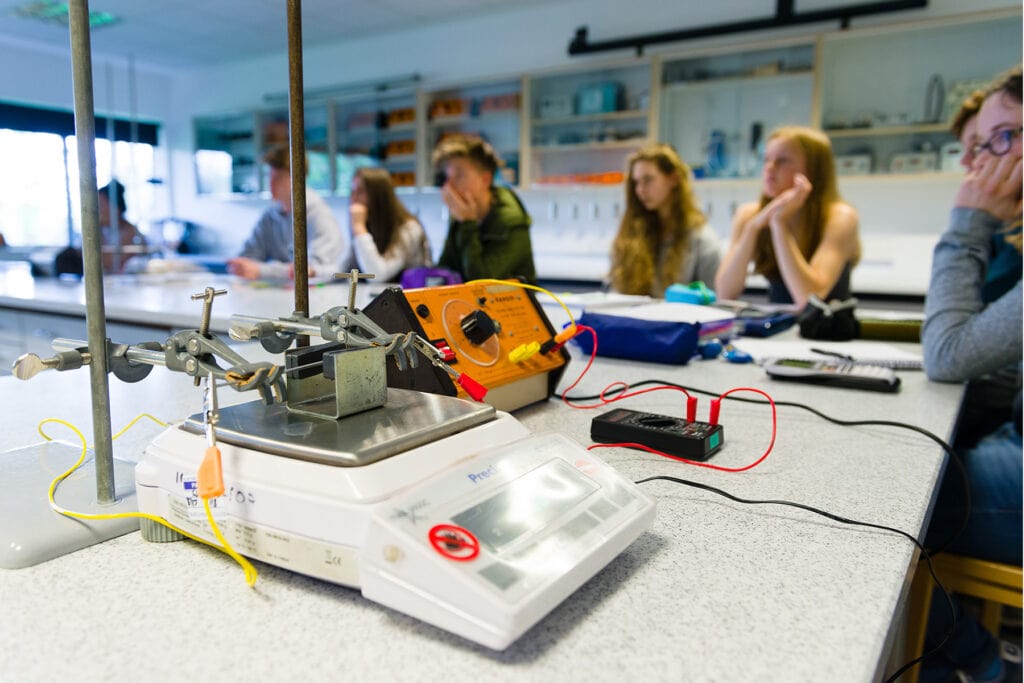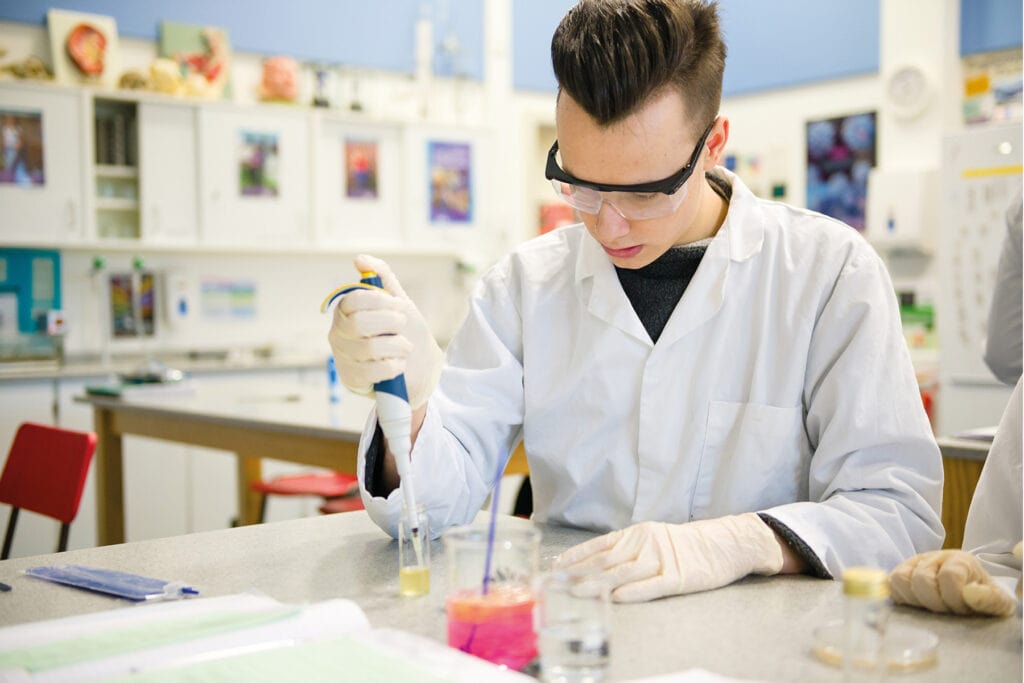New students starting in September: You can find more information about Induction days and submitting your GCSE results in our Start of Year Guide.
WHY CHOOSE THIS COURSE?
If you enjoy the study of the substances that make both us and our surroundings, then chemistry is the subject for you. Chemistry is everywhere: in the food we eat and the water we drink, from the clothes we wear and our mobile phones to the medicines that keep us healthy. During this course, you will learn about chemistry in a range of different contexts and the impact it has on industry and many aspects of everyday life. You will learn to investigate and solve chemical problems in a range of contexts, truly making A Level Chemistry a challenging and interesting course.
Chemistry is truly the “central science”. New breakthroughs in fields such as genetics, biochemistry, medicine and pharmacy, materials science (including nanotechnology), forensics, the environment and next generation computer hardware are all driven by chemistry. Emphasis throughout the course is on developing your knowledge, competence and confidence in practical skills and problem solving, together with enhancing your understanding of key chemical ideas and how they link to each other.
Apply for this course
Start date: 08/09/2025
TOP COURSE HIGHLIGHTS
Excellent lecturer support
Small class sizes
New laboratories
Links to STEM careers
Enrichment opportunities

Supportive, specialist staff
The chemistry team are friendly, supportive, hardworking and committed to helping you succeed. Reaching your potential in this subject relies heavily on your attendance, punctuality and commitment to learning and revision, and acting on advice given by your lecturer.
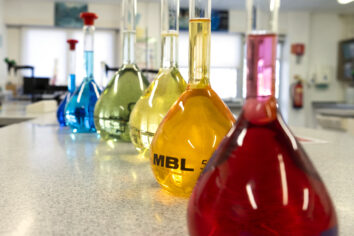
Practical Focus
Practical lectures will enable you to develop confidence in working experimentally, as well as increasing your knowledge and skills regarding scientific method, data analysis and the presenting of data.
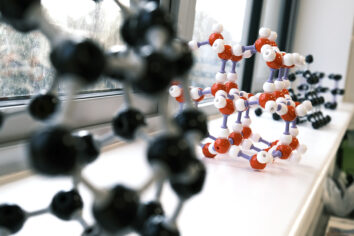
Enrichment Activities
Our students have access to a wide range of enrichment activities, including competitions such as the RSC Schools Analyst Competition, the RSC Chemistry Olympiad and the Cambridge Chemistry Challenge. Students interested in medicine, dentistry and veterinary science also have the opportunity to take part in our very popular Medics’ Academy.
WHAT WILL I LEARN?
A Level Chemistry is an academic course designed to increase your knowledge, skills and understanding of the chemistry and related sciences and support your ability to apply that knowledge to solve problems. The course is studied as part of a programme of A Levels and has both theory and experimental components to the course.
You will study through theory and experimental based lectures, meeting new concepts and applying them to a range of situations. You will develop your problem solving and mathematical skills, as well as understanding of a range of diverse topics, and there will be a clear focus on how to apply your understanding to solve problems of increasing complexity. There is an emphasis on the application of mathematics within the course and how it can be used to explain the world around us.
You will study all six modules over the two years which will be assessed at the end of the two-year linear course. In addition, students are required to successfully complete the Development of Practical Skills in Chemistry (Module 1) which prepares you for examinations and also higher education and future careers.
Module 1 Development of Practical Skills in Chemistry: Chemistry is a practical subject and the development of practical skills is fundamental to you understanding the nature of Chemistry. You will build practical skills throughout the A Level course which will lead to a practical endorsement. You will be required to undertake 12 core practical investigations, but you will experience many more throughout the course as practical work reinforces the theory studied. The practical skills developed throughout the A Level programme will be assessed by your lecturers and will be based on direct observation of your competency in a range of skills that are not assessable in written exams. Evidence to support the practical endorsement is gained over the course of the two years and is assessed on a pass or fail basis. You will be assessed on your conceptual and theoretical understanding of experimental method in the written exams at the end of your A Level studies.
In Year 1 you will study 3 modules in addition to Development of Practical Skills:
Module 2 Foundations in Chemistry: This module builds on your studies of GCSE Chemistry and provides you with knowledge and understanding of the important chemical ideas that underpin the study of A Level Chemistry including atomic structure, quantitative chemistry, reactions of acids, oxidation numbers and reduction and chemical bonding.
Module 3 Periodic Table and Energy: In this module you will develop your understanding of inorganic and physical chemistry. Topic areas studied allow you to consider the application of energy use to everyday life and industrial processes and current environmental concerns associated with sustainability. Key topics are the periodic table and patterns in properties, enthalpy changes and their determination, rates of reaction, reversible reactions and chemical equilibrium and consideration of energy and yield in improving sustainability.
Module 4 Core Organic Chemistry: This module introduces you to organic chemistry and its important applications to everyday life. It enables you to understand how key reactions take place and how the structure of molecules are determined. This is a fundamental area of chemistry; in addition to developing your organic practical skills you will study naming and formulae representation, organic reactions and isomerism, alcohols and haloalkanes, organic synthesis and instrumental analytical techniques to provide evidence of structural features in molecules.
In Year 2 you will study two further modules in addition to Development of Practical Skills:
Module 5 Physical Chemistry and Transition Elements: This module extends your understanding of energy, reaction rates, equilibria and the periodic table. It focuses on the study of reactions and how chemists use experimental data to alter reaction conditions. The main areas studied are rate, equilibrium, acids, bases and buffers, lattice enthalpy, entropy and free energy, electrochemistry and transition elements.
Module 6 Organic Chemistry and Analysis: This module introduces you to several new types of molecules and emphasizes the importance of organic synthesis. It also adds NMR spectroscopy to your range of instrumental techniques used in organic and forensic analysis. The main areas studied are aromatic compounds, carbonyls including carboxylic acids, esters, amines, polymers and organic synthesis.
WHERE WILL IT TAKE ME?
Studying Chemistry provides you with many skills such as problem solving, communication, creativity, and teamwork; hence chemistry students are much sought after and pursue careers in many exciting fields of work including medicine, dentistry, pharmacy, veterinary science, applied sciences and engineering. Chemistry is a highly respected A Level that is valued for most degree subjects.
If you want to study medicine, dentistry, pharmacy, or veterinary science you will need A Level Chemistry. However, an understanding of chemistry is desirable for a variety of university courses including geology, environmental science, and materials science.
ASSESSMENT ARRANGEMENTS
Your achievement in this subject is dependent upon excellent attendance, punctuality and effort. You will learn in a friendly atmosphere, using a variety of assessment methods:
You will be assessed through end of topic tests under timed conditions in class, regular homework questions and through completion of class activities. You will then be given detailed feedback on your progress.
Investigative skills and understanding are a vital part of the scientific process and you will be expected to develop your practical proficiency throughout the course.
You will review your own performance in 1:1 sessions with your tutor.
You will undertake mock examinations on each unit in advance of your final exams.
You will sit formal A Level exams at the end of your two years of study. A Level grades will be based only on marks for written exams, and your practical endorsement will be assessed separately as pass or fail.
ENTRY REQUIREMENTS
A minimum of 5 GCSEs at Grade 4 or above, including at least Chemistry Grade 6 or Combined Science Grades 66, English Grade 5 or a Humanities subject Grade 5, and Maths Grade 6.
INFORMATION & SUPPORT
You will be expected to undertake at least 4-6 hours of independent study time per week. Throughout the year you will be able to access additional support through Chemistry Clinic drop-in session, dedicated revision workshops, tailored 1:1 provision, as well as a variety of additional opportunities to stretch and challenge the most able students. We encourage you to proactively engage with the support available in order to reach your full potential.
Our chemistry staff at the college are a highly experienced team who focus on delivery of chemistry-based content in the 16-19 curriculum. We help to engage students and nurture their enthusiasm of the subject whilst also giving all learners the support they need to achieve on the course. We are also very keen to offer students the opportunity to engage in stretch and challenge activities, such as Olympiad competitions, and to support our students to make rewarding progression to higher education, work-based training or employment. Students benefit from access to a modern chemistry laboratory, as well as a staff team with substantial expertise within the teaching of chemistry at this level.
Meet the staff, tour the campus and find out about life as a student at one of the best colleges in the country.
